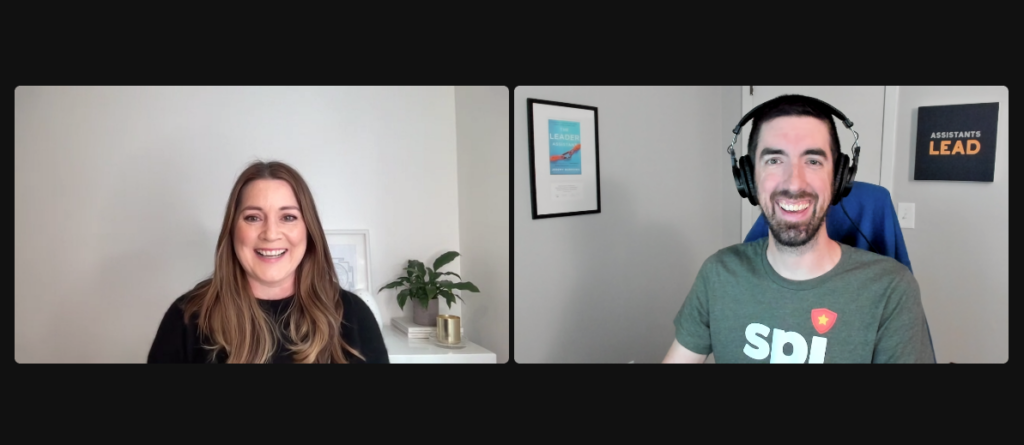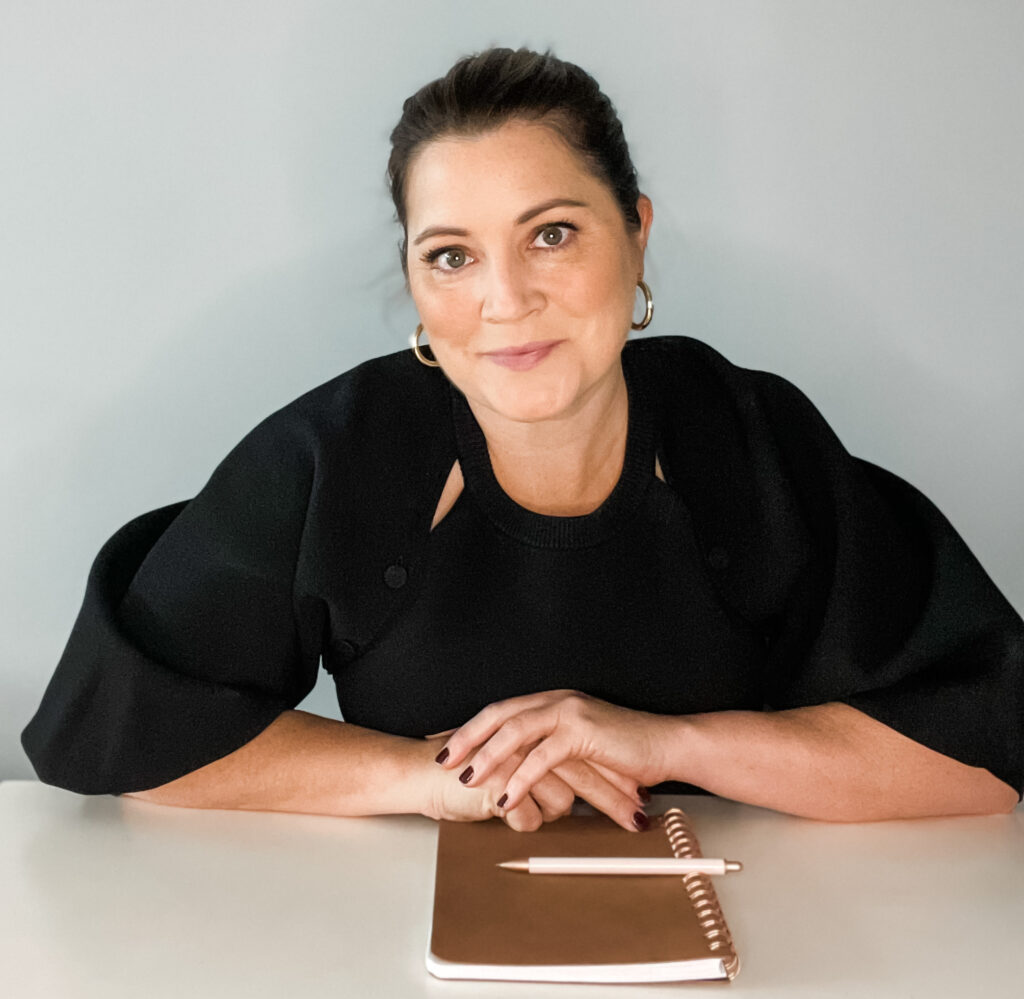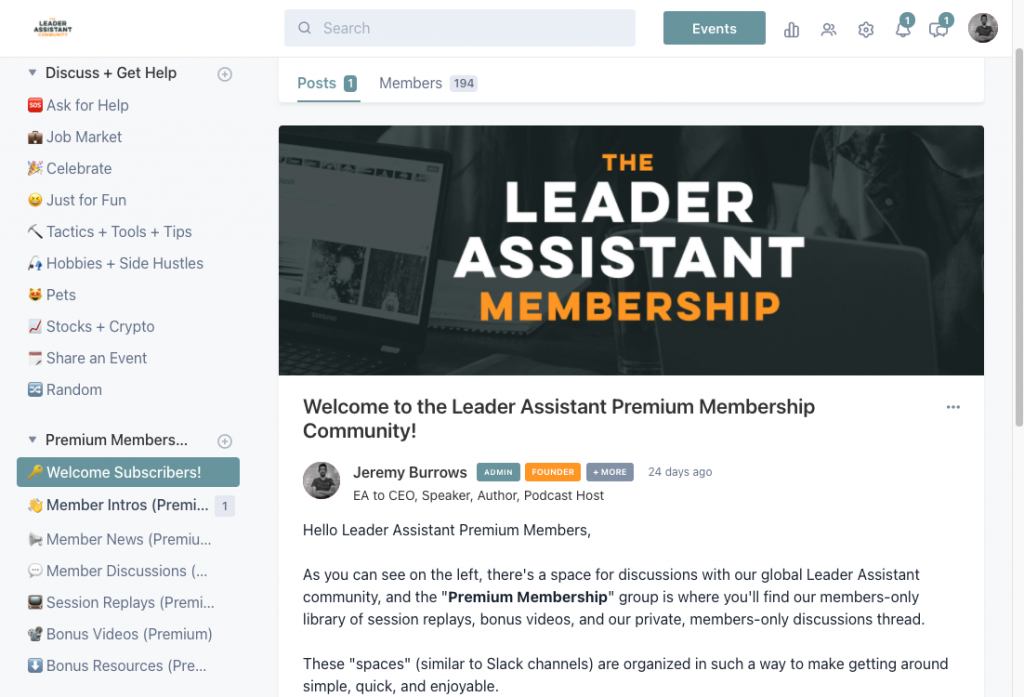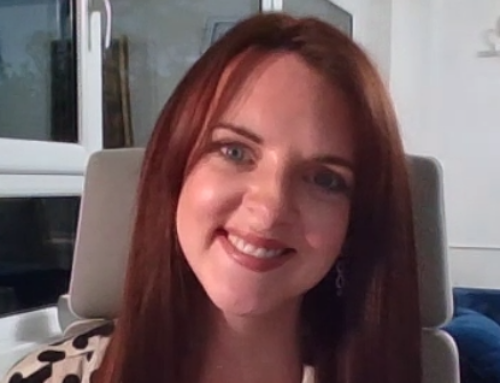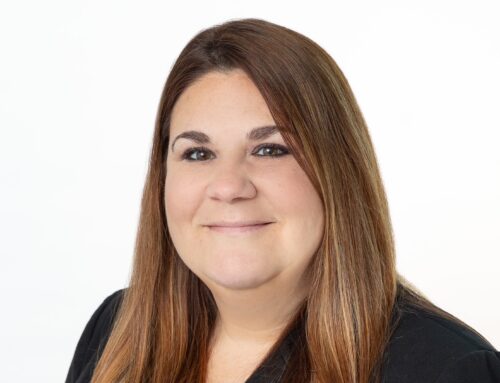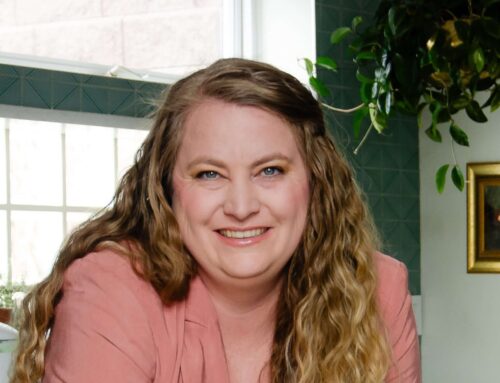Rachael Bonetti has 27 years of experience as an executive assistant supporting a high profile billionaire, prominent business leaders, entrepreneurs, change makers, thought leaders, and high performing CEOs.
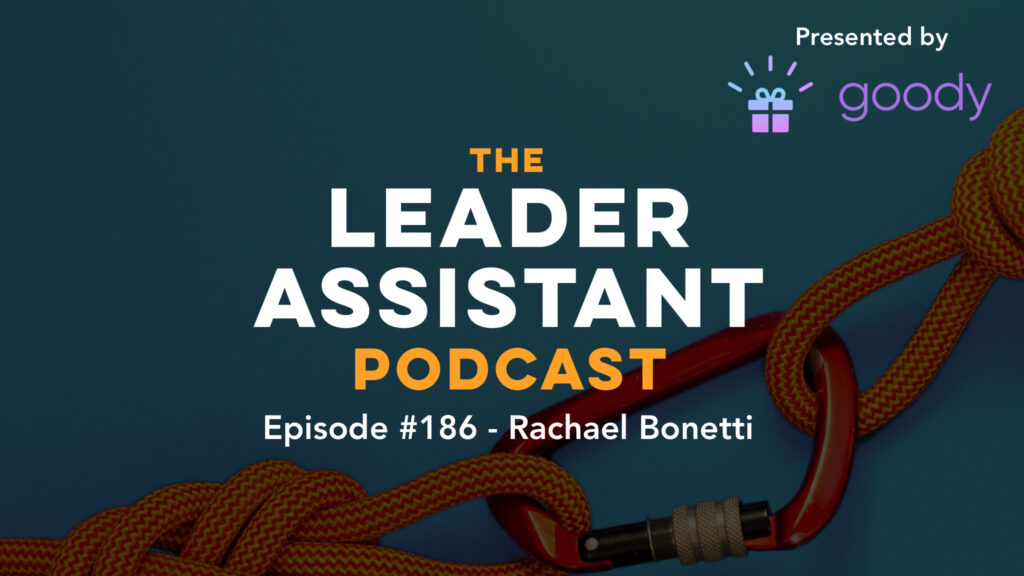
In this episode of The Leader Assistant Podcast, Rachael talks about the importance of prioritizing yourself, avoiding burnout, and the biggest blocks assistants face in their careers and life.
LEADERSHIP QUOTE
One of the criticisms I’ve faced over the years is that I’m not aggressive enough or assertive enough or maybe somehow, because I’m empathetic, it means I’m weak. I totally rebel against that. I refuse to believe that you cannot be both compassionate and strong.
– Jacinda Ardern (Prime Minister of New Zealand)
CONNECT WITH RACHAEL
- Rachael on LinkedIn
- Website – rachaelbonetti.com
- Podcast – What it Means to Be Well
ABOUT RACHAEL
Rachael is a former career EA with 27 years of experience supporting a high profile billionaire, prominent business leaders, entrepreneurs, change makers, thought leaders, and high performing CEOs.
Today, Rachael creates and delivers the development programs she wished existed as she moved through her career, as well as workplace wellbeing programs to help busy humans avoid burnout. A certified meditation facilitator and Wayapa Wuurrk practitioner, she is based on the Mornington Peninsula in Australia, supports clients all over the world, and is the host of the What It Means To Be Well podcast.
THE LEADER ASSISTANT PODCAST IS PRESENTED BY GOODY
A special thanks to my sponsor, Goody!
If you send business gifts to employees, clients or sales prospects, Goody is a game changer. You can send one gift or hundreds at the same time, without ever worrying about shipping details. With Goody, your gift recipients provide all their shipping info, and they can even swap out your gift for another option if they prefer. It’s free to start gifting and you get a $20 credit when you sign up. Oh and if you mention you heard about Goody on The Leader Assistant Podcast, Goody will add an extra $10 credit to your account.
Go here to start gifting today!
THE LEADER ASSISTANT PREMIUM MEMBERSHIP
To learn more about how you can join growth-minded Leader Assistants, check out our Leader Assistant Premium Membership for ongoing training, coaching, and community.
THE LEADER ASSISTANT BOOK
Download the first 3 chapters of The Leader Assistant: Four Pillars of Game-Changing Assistant for FREE here or buy it on Amazon or Audible.
LEADER ASSISTANT LIVE EVENTS
Check out our constantly updated schedule of events for admins and assistants at LeaderAssistantLive.com. Including our all-day, online leadership workshop at leaderassistantlive.com/workshop.
JOIN THE FREE COMMUNITY
Join the Leader Assistant Global Community here, or the Facebook Group here for bonus content and to network with other assistants who are committed to becoming leaders!
SUBSCRIBE
Subscribe to The Leader Assistant Podcast so you don’t miss new episodes!
You can find the show on Apple Podcasts, Spotify, Google Podcasts, Pandora, and Stitcher.
Join my email list here if you want to get an email when a new episode goes live.
LEAVE A REVIEW
If you’re enjoying the podcast, please take 2 minutes to rate and review the show on Apple Podcasts here. Each review helps me stay motivated to keep the show going!
—
EPISODE TRANSCRIPT
Dr Sharon Grossman 0:00
Hello, I’m Dr. Sharon Grossman. And my quote for you is from Jhansi. Maxwell, who said a leader is one who knows the way goes the way and shows the way
Podcast Intro 0:18
The Leader Assistant Podcast exists to encourage and challenge assistants to become confident game changing leader assistants
Jeremy Burrows 0:33
The Leader Assistant Podcast is brought to you by goody. If you’re starting to think about holiday gifts for your team, like I am goody is a game changer. They have amazing gifts that people will really love including brands that give back to charitable causes. As a longtime executive assistant, I’ve always been nervous about holiday gifting season. But thankfully, goody’s platform lets you send one gift or hundreds at the same time without ever worrying about shipping details. Can I get an amen? With goody your gift recipients provide all their shipping info. And they can even swap out your gift for another option if they prefer. It’s free to start gifting. And you can get a $20 credit when you sign up. Oh, and if you mentioned you heard about goody from The Leader, Assistant Podcast, goody, we’ll add an extra $10 credit to your account. Go to leaderassistant.com/goody to start gifting today. Hey, friends, thanks for tuning in to The Leader, Assistant Podcast and your host, Jeremy Burrows. And I’m very excited to be speaking with Dr. Sharon Grossman. Today, and we’re gonna be talking about how to save your sanity and prevent burnout. And this is episode 183. You can check out the show notes at leaderassistant.com/183. So Dr. Sharon Grossman, you are a success coach, speaker, author of the Amazon bestseller The 7E solution to burnout. And you help high achievers cracked the code of their burnout so they can find tailored solutions for recovery. And when you say the word in your bio high achievers, I don’t know if there’s really a better phrase to describe executive assistant. So we’re excited to chat with you today. And then when you say burnout, I’ve I’ve written about burnout in my book, I’ve experienced burnout firsthand. And yeah, I’m passionate about helping people resist burnout as well. So Dr. Sharon, tell us a little bit about just to get started. What city do you live in? And you know, maybe what’s one of your favorite hobbies? And what do you like to do with your spare time?
Dr Sharon Grossman 2:45
Yeah, well, first of all, Jeremy, thank you so much for having me on the show. I’m excited to be here and to speak to your audience. Because burnout is real. And I’m sure they’re all dealing with it. So I am currently living in Miami Beach. And one of my favorite pastimes when I’m not working is salsa dancing.
Jeremy Burrows 3:06
Oh, nice. Very nice. How’d you get into that?
Dr Sharon Grossman 3:10
I got into it when I was in my 20s. And I was living in New York. And then I, you know, started a family and I got really busy. So I kind of dropped off from that. And then when we moved here a year ago, I got back into it because there’s a real big salsa scene here in Florida. So yeah, it’s been really fun. And I go to dance classes twice a week in the evenings. And then every once in a while they’ve got a little social. So we get together with other folks from other places. And it’s it’s a dance party. So it’s super fun.
Jeremy Burrows 3:47
Nice. So tell us a little bit about your career. What What was your maybe first quote unquote, real job? And how did you end up where you are now? And then we can talk a little bit about what you what you’re up to right now.
Dr Sharon Grossman 4:02
Yeah, so it’s kind of funny to say real job because you work for basically no pay when you’re a student. And I did that for probably 10 years. So my first quote unquote real job was when I was actually making a salary, which was at a nonprofit. And what I was doing there was, we were part of this program that was helping young adults who were having their very first psychotic break, to learn the tools in order to manage their mind so that they have a way of coping rather than, you know, growing up and getting into adulthood, where there’s a lot more responsibilities and things on their plate and then having that become more of a chronic issue for them. So I was trying to do early intervention. So that’s where I started and then eventually ended up in a private practice as a therapist seeing patients and And now, I’m not doing that sort of thing anymore. I’m not in a clinic, I work from home, which I love. And I do coaching, which is great, super fun.
Jeremy Burrows 5:11
Nice, and you submit to work from home, what’s your top tip for staying productive while working from home with kids and pets and all the distractions?
Dr Sharon Grossman 5:25
I don’t think that there’s like one thing, but I will say Google Calendar is my friend. And I definitely encourage people to schedule tasks on their calendar as much as possible, because it keeps you organized. It is definitely a trap to just create a to do list and think that you’re going to get to the things whenever because it becomes just overwhelmed city. So I like to just say, Okay, well, I have to do, let’s say these five tasks. And how long does each one we’re going to take this is going to take an hour, this is going to take 30 minutes, and then find time on my calendar, where I’ve got that hour or that half hour or however long it takes, and then plug that in, so that I know exactly when it’s gonna get done. Thanks. Now, that doesn’t necessarily account for kids and everything else. But you know, if you if let’s say my kids are in elementary school and middle school, so I know that they’re out of the house at a certain time, and then they get home at a certain time. So try to get certain things done during the day when they’re out of the house. And then if I know that I have something like right now, which is a little bit later in the day, and they’re home, I just locked the door.
Jeremy Burrows 6:40
Very nice, very nice. So why do we burn out? And tell us a little bit about your story and your experience with burnout?
Dr Sharon Grossman 6:53
Yeah, so I’ll actually flip it, I’ll start with my story, which a lot of times people assume because I do this kind of coaching that I’ve burned out. And I’ve kind of learned all the reasons and all the things that help. And that’s why I do the work that I do. And it’s actually not the case. So when I was in grad school, I went to a psychology conference. And I attended a workshop given by a psychologist who was in private practice at the time. And he was talking about how practitioners in private practice very often burnout. And so this was while I was still in school. And so I kind of made this mental note of like, don’t go into private practice. I don’t want to be one of those people. And then I went to the nonprofit that I told you about. And then at some point, I was trying to figure out, like, where am I going from here. And I looked at all my options, and none of them really fit. And so long story short, I ended up realizing, I have to go create my own private practice, because I’m not finding myself anywhere else. But I remembered that lecture. And I decided, well, if I’m going to do this, I’m going to do this right, which meant that I had to be really intentional about the way that I work, the hours that I worked all these different things. And so I did I set it up in such a way where, you know, I got an office space that was near my gym, I would set my hours, I would go work out in the middle of the day, like I would do all these things to make sure that I have that balance. And I’m healthy, and I’m taking care of myself throughout. And that was really great. And then I decided, at some point to actually do some research on the topic of burnout because I was dealing with a lot of high achievers. And as I started to do that research, I realized that so many of them are experiencing burnout without actually realizing it. So so once I realized what burnout really was about doing all the research, then as they would come in describe what’s going on for them. I’d say it sounds like you’re burned out, or that you’re burning out. And they’d be like, oh, yeah, that sounds right. So what I realized is that a lot of people actually aren’t aware that they’re burned out. And it’s a really fine line, because we all say that we’re stressed all the time. But there’s a difference between acute and chronic stress. And we all have acute stress that we can kind of, you know, just get through a day and forget about it and move on. But when stress becomes chronic, that’s where you’re burning out. Right? It’s just that accumulation of stress that’s unrelenting. That’s day after day after day, that’s actually what burnout is. And it shows up in different ways. And it shows up for different reasons. So I kind of made it my mission to go out and educate people about burnout so that they can catch it early on. And then from there I got even more nuanced into telling them not just like what to look out For but also why it’s happening. And there’s you asked about that there’s, I’ve kind of narrowed it down to seven things. Which, you know, as a fun kind of side note, they all come together to spell burnout. Nice, nice. Yeah. So that’s kind of an easy mnemonic acronyms. There you go. And so yeah, we can talk briefly about what the seven things are. And then I also talked about how there’s things that we bring to the table. So yeah, we’re all familiar with all the things that are out there that exists in the world that contribute to our stress, right, we say, oh, it’s, you know, I have high demands, and I work in a high pressure job. And my boss is a micromanager. And, you know, the people that I work with suck, and it’s a toxic environment. And like, we’re constantly pointing to all the things that are there, which, by the way, might be true. And that might not be the whole picture. So what I’m also interested in is helping people focus on the things that they actually have control over, which is what you’re bringing to the table. And then that’s where we’re kind of decoding your burnout based on not just the environmental stressors, but also your programming and your personality. So that’s, that’s kind of my whole kind of signature piece of this. But with regards to, I’ll just briefly mention the seven reasons why people burn out. So the first one is that you’re feeling blocked for a variety of reasons. And I’ve actually written a whole blog article where I take you through, like 10, different possibilities, but there’s probably endless things. Think about things that block you from the outside, as well as things from the inside, right. Sometimes we block ourselves, we sabotage we do all kinds of things. So these are things that kind of can get in the way. And if you feel really stuck, and you’re not able to get past that can be really frustrating. And then over time, that stress can kind of build up and you can burn out. Second one is unfairness. So there’s a lot of unfairness that can happen on the job, whether it’s unfair treatment, or there’s something unethical or immoral that’s happening, maybe you don’t get the promotion and somebody else does. But it wasn’t because they deserved that it was because they’re kind of like, buddy, buddy, with the boss or something like that, you know, there’s all kinds of things that go on, there’s discrimination on the job. So all kinds of things that fall under that heading, there’s resentment. So a lot of my clients actually believe it or not feel a ton of resentment at their jobs. And that is a huge burnout thing. They’re resentful for all kinds of reasons, you know, and if you feel this way, you know what I’m talking about. And that overtime can actually affect you in a lot of negative ways. So we want to take a look at that. Number four is neglect. So what I mean by that is that we’re not taking care of ourselves, or we’re putting ourselves on the back burner, we’re not, we always say, Oh, I’m so busy, I don’t have time for self care, I don’t have time for exercise, I don’t have time for you know, whatever it is meditation, you name it, we’re really focused on the to do list, we’re focused on pleasing everyone else, and we’re not spending enough time on ourselves. So that’s a contributing factor. Because then what happens is you run out of steam, and then you just can’t keep going, can’t keep doing all the things that you need to do. And often, my clients tend to be not just busy at work, but they’re because of their nature being the high achievers that they are, they’re taking on a million things outside of work on top, right? So they’re like, Oh, I’ve got like the three five kids in the two dogs. And I’m, you know, starting volunteering at the school and under, you know, like 100 thing. So it’s too much for anybody. And if you’re not managing your energy, if you’re not protecting your energy, then you’re gonna run up against a problem. Oh, is for overloaded. So that’s kind of pretty clear cut. But it’s really about why do we overload ourselves. It’s not just that the job puts too much on us, but also that we maybe take on too much. And that creates a lot of overwhelm. And over time, that can also lead to burnout. You is for unrecognized so a lot of my clients actually feel like they do so much. And they really want to help and they help all these people around them to promote them and to get them to the next level. And then if they don’t get the appreciation that they hoped for. They get really resentful. They get really burned out because they’re like, at some point, they do a 180. And they’re like, Well, then why should I help anybody? Right? It doesn’t matter. So it’s almost like I’m not looking for every like, it’s not like tit for tat. Like, I’m not looking for every person that I do something for to get something back. But if that happens chronically, like, I’ve helped, you know, 100 people, and I’ve gotten like two thank yous, then it feels like a thankless kind of job. And so that rubs people the wrong way. And then finally, T is for trauma. And sometimes we do experience trauma on the job, whether it’s because, you know, we talked about discrimination earlier on, but it could be a lot of other things that are going on, people are yelling at you people are mistreating you. So there’s all kinds of things that happen, I want to talk to a lawyer who said she had such trauma on the job that even after she left that place of work, every time she would drive by the building, she would like be shaking in her car. Right? So our brain starts creating these associations between the location and that state of panic. And so it stays in our nervous system. And so I just wanted to mention, there’s a whole bunch of reasons, as you can see why we might burn out.
Jeremy Burrows 16:13
Wow. Yeah, that’s great. Thanks for helping and I’m assuming you go through all of that in depth in your book, is that right?
Dr Sharon Grossman 16:21
Actually, those are something I just came up with recently. To. Right now, they’re like, if you want, you can check out my blog. It’s like, I’ve actually broken it down into all the different parts. And I’ve got a blog that goes a little bit more deeply into each and every single one of those.
Jeremy Burrows 16:37
Okay, yeah, we’ll put that in the show notes, for sure. So people can dive deeper. So I have a couple of questions. But first, I want to get into assistance. So what experience do you have? Have you had assistants? Have you worked with assistants? And what’s kind of your general thought on what you’ve seen with the assistant profession?
Dr Sharon Grossman 17:00
So I worked with assistants in two different capacities. I have assistants that helped me in my business. And I’ve also had assistance as clients. Right, because they were feeling a lot of anxiety, a lot of stress, a lot of burnout. And so I’ve had them from both ends. And, you know, I think it’s a very varied experience across the board, because it really depends who you are. And, but by that, I mean, like, what is your personality? How do you cope with stress? What else do you got going on? Right? So there’s a lot of individual factors. And then there’s also what’s going on, on the job, the environmental stuff. So for instance, I worked with an executive assistant who was working for slack, if you’re familiar with that. So that’s a pretty big technology company. She had a pretty good job, she was really happy there. But she was somebody who had a lot of impostor syndrome. So it’s that need to constantly prove yourself that you deserve a place at the table. And then if it’s a big company like that, then there’s so many different executives, and each one of them has an assistant. And so then you’re like trying to compare yourself to other people’s assistants and trying to figure out like, how do I measure up. And then there’s all these like rankings of assistants. And so maybe you come in at a certain level, and you want to go to the next level. And so there’s constantly like that comparison thing that happens. And with that, you can have stress and anxiety and burnout and all that kind of stuff. But there’s also burnout as a result of just always being on. And if you work for somebody who’s like a high stress case, then you’re more likely to become a version of that, I think, right? Not always, I think it really boils down to boundaries and confidence, and just things that will help keep you in check and help keep them in check. And I really believe that even though they’re calling the shots, and you’re there to assist them, I think there is something to be said, for having good boundaries with your boss. And sometimes they’re just all over the place, which is why they need you. But if you’re really good at holding boundaries and helps to just calm them down a little bit, and sometimes they need that structure. So I want to just put that out there because I think a lot of times assistants feel like they just have to bend over backwards and do everything and make everything happen like yesterday. And yeah, I get it like you work for people who are super busy and sometimes maybe don’t manage their own stress very well and they might put it on you and get upset and then you might take it personally and then you can kind of spiral it And I also think that there’s a place where you can just rewrite the whole script and say, like, Okay, I am really good at what I do. And I’m here to help this person. And you might even say that to them, like, I’m here to help you. But I need us to work together in a way that works for me, too. So it’s kind of like a, help me help you kind of have a conversation, right? Or phrases. Yeah. And then you can set the stage for how that goes rather than them. Just think that you’re there to get dumped on.
Jeremy Burrows 20:34
Yeah. Well, that’s well said. And I think that that’s why I’m really passionate about helping assistants see themselves as leaders, because, you know, like you said, a lot of times assistants will mirror what their executive is, and the good and the bad. And, you know, our job is to complement them. And to sharpen each other not, not just, you know, create a mini me of, of the executive. So let’s, Thanks for Thanks for diving into that.
Dr Sharon Grossman 21:07
Yeah, and I think that if you work for somebody who really does appreciate you, it can be a very fulfilling role for you, because you’re like, I’m helping this person be successful. I’m like the behind the scenes person that gets them organized and make sure everything is taken care of for them so that they can do what they’re really good at. Right, right. And so and I know that because I have assistants that work for me, and I really appreciate them. Because if it wasn’t for them, I would have a lot more on my plate, which means I would have a lot less time to do the things that only I can do. And so I think it’s important to treat our assistants, right. And to appreciate them, and to celebrate them and to not eat or to keep ourselves in check. So that we’re not, as I said, dumping onto them or having you know, and we do that as parents do. Right. We dump on our kids, we, you know, people bring their stress home all the time. So that’s that’s important as a life skill anyway,
Jeremy Burrows 22:09
right? Yeah. Great. Well, to kind of wrap things up, and you know, it’s been been fun chatting with you, you know, you mentioned the seven, a solution to burnout. And he talked about the acronym. As you were going through that, you know, I was relating to a lot of the burnout signs, but also just thinking about all the assistants that I’ve talked to over the years, who tell me exactly, essentially, exactly what you said about that’s how their work is going right now. That’s her their, their job with their boss is going right now. So what would you say to those listening who are like, alright, I get it, I’m burned out. And now what, you know, what do I What do I do from here?
Speaker 1 22:56
Yeah, so I actually created a burnout checklist, so that people can number one, if you’re not sure, if you’re burned out, you can really kind of confirm, and it’s got all the kinds of signs that you want to look out for. But then if you do know that you’re burned out, or if you find that you’re burned out, then we kind of have so then what, what to do, and I’ll walk you through that and explain a little bit of what’s going on. So I really invite everybody to download that, because that’ll be a great first step for you. And then from there, I send some additional emails, if you’re on my list, you you also get weekly newsletters with all of my latest updates, which include my blogs, and my podcasts and all the things that I’m working on. So everything is burnout related. So if you’re interested in the topic, for sure. Get on that. And you can download that at DrSharongrossman.com/burnout checklist.
Jeremy Burrows 23:52
Awesome. So we’ll put that in the show notes, leaderassistant.com/183, and a link to all of that so people can dive in. So what would be one practical tip for resisting burnout and preventing burnout that you want to leave people with just something that they can, as they’re, you know, driving home from work, or going for a run or doing dishes listening to this podcast? What what’s one thing that they should, you know, implement in their life that they can implement in the next 24 or 48 hours to help?
Dr Sharon Grossman 24:30
Yeah, so you know, we talked earlier about that Google Calendar and scheduling things. And I think it’s important not just to get our work done, but to also think about our life outside of work. And so one of the things as I mentioned, people often say is I don’t have time for self care. So whether it is that you want to go to the gym, you want to take a dance class, you want to take a tennis lesson, whatever to take care of yourself schedule at a In. In that way, you’ve already carved out the time in advance, and you know that it’s going to happen. So if you can, like live and die by Google Calendar, that’s definitely a great way to make sure that you get all the things that you want done. And you have that nice balance to keep you inject. Because otherwise, what happens is the stress just accumulates and accumulates and accumulates, and that really puts you in danger of burning out. Long term. Yeah.
Jeremy Burrows 25:30
Awesome. Yeah, it’s great tips. And I think that, thankfully, assistants are really good at calendaring. But often we really lead our executives calendar really well. But we just, you know, neglect our own. And we might have a really good system for our executive of here’s some focus time, here’s your, here’s time to go work out and do your hobbies. And I’m, you’re balanced. I’ve got you all balanced. But then we look at our own calendar and we’re like, wait, what this is this, we need to spend some time on our own life. So appreciate appreciate it. All right. Well, Dr. Sharon, thank you so much for taking time and I look forward to having my listeners reach out and learn more and check out the burnout checklist for sure. And we’ll talk soon.
Dr Sharon Grossman 26:21
Awesome. Thanks again
Podcast Intro 26:32
please live you on Apple podcast.
Unknown Speaker 26:42
Goburrows.com

